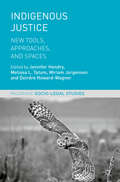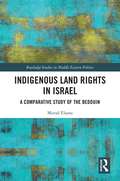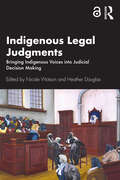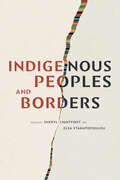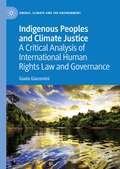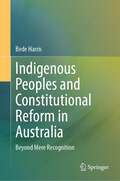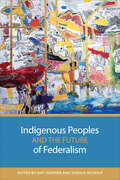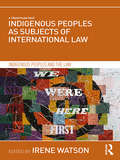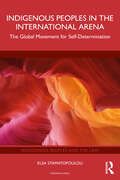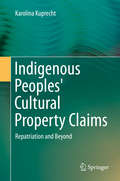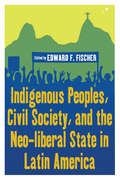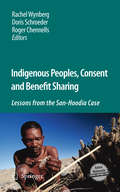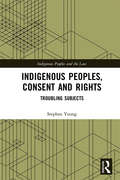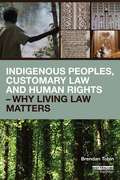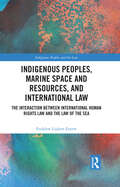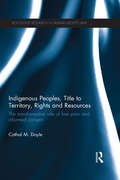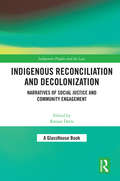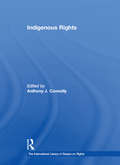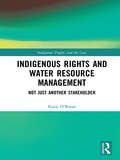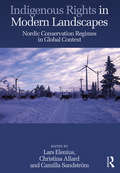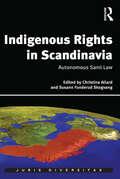- Table View
- List View
Indigenous Justice: New Tools, Approaches, And Spaces (Palgrave Socio-Legal Studies)
by Jennifer Hendry Melissa L. Tatum Miriam Jorgensen Deirdre Howard-WagnerThis highly topical collection of essays addresses contemporary issues facing Indigenous communities from a broad range of multi- and interdisciplinary perspectives. Drawing from across the social sciences and humanities, this important volume challenges the established norms, theories, and methodologies within the field, and argues for the potential of a multidimensional approach to solving problems of Indigenous justice.Stemming from an international conference on ‘Spaces of Indigenous Justice’, Indigenous Justice is richly illustrated with case studies and comprises contributions from scholars working across the fields of law, socio-legal studies, sociology, public policy, politico-legal theory, and Indigenous studies. As such, the editors of this timely and engaging volume draw upon a wide range of experience to argue for a radical shift in how we engage with Indigenous studies.
Indigenous Land Rights in Israel: A Comparative Study of the Bedouin (Routledge Studies in Middle Eastern Politics)
by Morad ElsanaIntroducing the Negev–Bedouin land issue from the international indigenous land rights perspective, this comparative study suggests options for the recognition of their land. The book demonstrates that the Bedouin land dispossession, like many indigenous peoples’, progressed through several phases that included eviction and displacement, legislation, and judicial decisions that support acts of dispossession and deny the Bedouin’s traditional land rights. Examining the Mawat legal doctrine on which the State and the Court rely on to deny Bedouin land rights, this volume introduces the relevant international law protecting indigenous land rights and shows how the limitations of this law prevent any meaningful protection of Bedouin land rights. In the second part of the work, the Aborigines’ land in Australia is introduced as an example of indigenous peoples' successful struggle for their traditional land rights. The final chapter analyzes the basic elements of judicial recognition of the land and shows that the basic elements needed for Bedouin land recognition exist in the Israeli legal system. Proposing practical recommendations for the recognition of Bedouin land, this volume is a key resource to scholars and students interested in land rights, international law, comparative studies, and the Middle East.
Indigenous Legal Judgments: Bringing Indigenous Voices into Judicial Decision Making
by Nicole Watson and Heather DouglasThis book is a collection of key legal decisions affecting Indigenous Australians, which have been re-imagined so as to be inclusive of Indigenous people’s stories, historical experience, perspectives and worldviews. In this groundbreaking work, Indigenous and non-Indigenous scholars have collaborated to rewrite 16 key decisions. Spanning from 1889 to 2017, the judgments reflect the trajectory of Indigenous people’s engagements with Australian law. The collection includes decisions that laid the foundation for the wrongful application of terra nullius and the long disavowal of native title. Contributors have also challenged narrow judicial interpretations of native title, which have denied recognition to Indigenous people who suffered the prolonged impacts of dispossession. Exciting new voices have reclaimed Australian law to deliver justice to the Stolen Generations and to families who have experienced institutional and police racism. Contributors have shown how judicial officers can use their power to challenge systemic racism and tell the stories of Indigenous people who have been dehumanised by the criminal justice system. The new judgments are characterised by intersectional perspectives which draw on postcolonial, critical race and whiteness theories. Several scholars have chosen to operate within the parameters of legal doctrine. Some have imagined new truth-telling forums, highlighting the strength and creative resistance of Indigenous people to oppression and exclusion. Others have rejected the possibility that the legal system, which has been integral to settler-colonialism, can ever deliver meaningful justice to Indigenous people.
Indigenous Legal Judgments: Bringing Indigenous Voices into Judicial Decision Making
by Nicole Watson and Heather DouglasThis book is a collection of key legal decisions affecting Indigenous Australians, which have been re-imagined so as to be inclusive of Indigenous people’s stories, historical experience, perspectives and worldviews.In this groundbreaking work, Indigenous and non-Indigenous scholars have collaborated to rewrite 16 key decisions. Spanning from 1889 to 2017, the judgments reflect the trajectory of Indigenous people’s engagements with Australian law. The collection includes decisions that laid the foundation for the wrongful application of terra nullius and the long disavowal of native title. Contributors have also challenged narrow judicial interpretations of native title, which have denied recognition to Indigenous people who suffered the prolonged impacts of dispossession. Exciting new voices have reclaimed Australian law to deliver justice to the Stolen Generations and to families who have experienced institutional and police racism. Contributors have shown how judicial officers can use their power to challenge systemic racism and tell the stories of Indigenous people who have been dehumanised by the criminal justice system.The new judgments are characterised by intersectional perspectives which draw on postcolonial, critical race and whiteness theories. Several scholars have chosen to operate within the parameters of legal doctrine. Some have imagined new truth-telling forums, highlighting the strength and creative resistance of Indigenous people to oppression and exclusion. Others have rejected the possibility that the legal system, which has been integral to settler-colonialism, can ever deliver meaningful justice to Indigenous people.The Open Access version of this book, available at http://www.taylorfrancis.com, has been made available under a Creative Commons Attribution-Non Commercial-No Derivatives (CC-BY-NC-ND) 4.0 license.
Indigenous People, Crime and Punishment
by Thalia AnthonyIndigenous People, Crime and Punishment examines criminal sentencing courts’ changing characterisations of Indigenous peoples’ identity, culture and postcolonial status. Focusing largely on Australian Indigenous peoples, but drawing also on the Canadian experiences, Thalia Anthony critically analyses how the judiciary have interpreted Indigenous difference. Through an analysis of Indigenous sentencing remarks over a fifty year period in a number of jurisdictions, the book demonstrates how judicial discretion is moulded to dominant white assumptions about Indigeneity. More specifically, Indigenous People, Crime and Punishment shows how the increasing demonisation of Indigenous criminality and culture in sentencing has turned earlier ‘gains’ in the legal recognition of Indigenous peoples on their head. The recognition of Indigenous difference is thereby revealed as a pliable concept that is just as likely to remove concessions as it is to grant them. Indigenous People, Crime and Punishment suggests that Indigenous justice requires a two-way recognition process where Indigenous people and legal systems are afforded greater control in sentencing, dispute resolution and Indigenous healing.
Indigenous Peoples and Borders
by Sheryl Lightfoot and Elsa StamatopoulouThe legacies of borders are far-reaching for Indigenous Peoples. This collection offers new ways of understanding borders by departing from statist approaches to territoriality. Bringing together the fields of border studies, human rights, international relations, and Indigenous studies, it features a wide range of voices from across academia, public policy, and civil society. The contributors explore the profound and varying impacts of borders on Indigenous Peoples around the world and the ways borders are challenged and worked around. From Bangladesh’s colonially imposed militarized borders to resource extraction in the Russian Arctic and along the Colombia-Ecuador border to the transportation of toxic pesticides from the United States to Mexico, the chapters examine sovereignty, power, and obstructions to Indigenous rights and self-determination as well as globalization and the economic impacts of borders. Indigenous Peoples and Borders proposes future action that is informed by Indigenous Peoples’ voices, needs, and advocacy.Contributors. Tone Bleie, Andrea Carmen, Jacqueline Gillis, Rauna Kuokkanen, Elifuraha Laltaika, Sheryl Lightfoot, David Bruce MacDonald, Toa Elisa Maldonado Ruiz, Binalakshmi “Bina” Nepram, Melissa Z. Patel, Manoel B. do Prado Junior, Hana Shams Ahmed, Elsa Stamatopoulou, Liubov Suliandziga, Rodion Sulyandziga, Yifat Susskind, Erika M. Yamada
Indigenous Peoples and Climate Justice: A Critical Analysis of International Human Rights Law and Governance (Energy, Climate and the Environment)
by Giada GiacominiThis book provides a new interpretation of international law specifically dedicated to Indigenous peoples in the context of a climate justice approach. The book presents a critical analysis of past and current developments at the intersection of human rights and international environmental law and governance. The book suggests new ways forward and demonstrates the need for a paradigmatic shift that would enhance the meaningful participation of Indigenous peoples as fundamental actors in the conservation of biodiversity and in the fight against climate change. The book offers guidance on a number of critical intersecting and interdependent issues at the forefront of climate change law and policy – inside and outside of the UN climate change regime. The author suggests that the adoption of a critical perspective on international law is needed in order to highlight inherent structural and systemic issues of the international law regime which are all issues that ultimately impede the pursue of climate justice for Indigenous peoples.
Indigenous Peoples and Constitutional Reform in Australia: Beyond Mere Recognition
by Bede HarrisThis book examines whether Australia’s constitution should be reformed so as to enable the country to fulfil its obligations under the United Nations Declaration on the Rights of Indigenous Peoples, which it ratified in 2009. The book surveys the history of the constitutional status of Australia’s Indigenous peoples from the time of colonisation through to the current debate on ‘Indigenous constitutional recognition’. However, it argues that the term ‘Indigenous constitutional recognition', implying that mere acknowledgement of the existence of Indigenous peoples is sufficient to meet their legitimate expectations, misrepresents the nature of the project the country needs to engage in. The book argues that Australia should instead embark upon a reform programme directed towards substantive, and not merely symbolic, constitutional change. It argues that only by the inclusion in the constitution of enforceable constitutional rights can the power imbalance between Indigenous Australians and the rest of society be addressed. Taking a comparative approach and drawing upon the experience of other jurisdictions, the book proposes a comprehensive constitutional reform programme, and includes the text of constitutional amendments designed to achieve the realisation of the rights of Australia’s Indigenous peoples. It ends with a call to improve the standard of civics education so as to overcome voter apprehension towards constitutional change.
Indigenous Peoples and the Future of Federalism
by Amy Swiffen Joshua NicholsAs a settler state, Canada’s claims to sovereign control over territory are contested by Indigenous claims to land and to self-determination. Indigenous Peoples and the Future of Federalism presents legal analyses that explore forms of federalism and their potential to include multiple and divided sovereignties. This collection aims to advance reconciliation with Indigenous peoples in Canada and elsewhere by developing jurisprudence on the possibilities for a nation-to-nation relationship between Indigenous nations and Crown sovereignty. Contributors use legal creativity to explore how federalism can be structured to include the constitutional jurisdiction of Indigenous nations. Several chapters are grounded in the Canadian context while others connect the issues to international law and other settler colonial jurisdictions, recognizing how Indigenous resistance to settler laws and government decisions can at the same time be the enactment of Indigenous legalities and constitutional cultures. Ultimately, Indigenous Peoples and the Future of Federalism offers innovative ways for Canada to move forward from this challenge using existing constitutional mechanisms to give life to a plurinational Canadian federalism inclusive of the jurisdiction of Indigenous peoples.
Indigenous Peoples and the State: International Perspectives on the Treaty of Waitangi (Indigenous Peoples and the Law)
by Mark Hickford Carwyn JonesAcross the globe, there are numerous examples of treaties, compacts, or other negotiated agreements that mediate relationships between Indigenous peoples and states or settler communities. Perhaps the best known of these, New Zealand’s Treaty of Waitangi is a living, and historically rich, illustration of this types of negotiated agreement, and both the symmetries and asymmetries of Indigenous-State relations. This collection refreshes the scholarly and public discourse relating to the Treaty of Waitangi and makes a significant contribution to the international discussion of Indigenous-State relations and reconciliation. The essays in this collection explore the diversity of meanings that have been ascribed to Indigenous-State compacts, such as the Treaty, by different interpretive communities. As such, they enable and illuminate a more dynamic conversation about their meanings and applications, as well as their critical role in processes of reconciliation and transitional justice today.
Indigenous Peoples as Subjects of International Law (Indigenous Peoples and the Law)
by Irene WatsonFor more than 500 years, Indigenous laws have been disregarded. Many appeals for their recognition under international law have been made, but have thus far failed – mainly because international law was itself shaped by colonialism. How, this volume asks, might international law be reconstructed, so that it is liberated from its colonial origins? With contributions from critical legal theory, international law, politics, philosophy and Indigenous history, this volume pursues a cross-disciplinary analysis of the international legal exclusion of Indigenous Peoples, and of its relationship to global injustice. Beyond the issue of Indigenous Peoples’ rights, however, this analysis is set within the broader context of sustainability; arguing that Indigenous laws, philosophy and knowledge are not only legally valid, but offer an essential approach to questions of ecological justice and the co-existence of all life on earth.
Indigenous Peoples in the International Arena: The Global Movement for Self-Determination (ISSN)
by Elsa StamatopoulouThis book provides a definitive account of the creation and rise of the international Indigenous Peoples’ movement.In the late 1970s, motivated by their dire situation and local struggles, and inspired by worldwide movements for social justice and decolonization, including the American civil rights movement, Indigenous Peoples around the world got together and began to organize at the international level. Although each defined itself by its relation to a unique land, culture, and often language, Indigenous Peoples from around the world made an extraordinary leap, using a common conceptual vocabulary and addressing international bodies that until then had barely recognized their existence. At the intersection of politics, law, and culture, this book documents the visionary emergence of the international Indigenous movement, detailing its challenges and achievements, including the historic recognition of Indigenous rights through the adoption of the UN Declaration on the Rights of Indigenous Peoples in 2007. The winning by Indigenous Peoples of an unprecedented kind and degree of international participation – especially at the United Nations, an institution centered on states – meant overcoming enormous institutional and political resistance. The book shows how this participation became an increasingly assertive self-expression and even an exercise of self-determination by which Indigenous Peoples could both benefit from and contribute to the international community overall – now, crucially, by sharing their knowledge about climate change, their approaches to development and well-being, and their struggles against the impact of extractive industries on their lands and resources.Written by the former Chief of the Secretariat of the United Nations Permanent Forum on Indigenous Issues, this book will be of interest to researchers, teachers, students, advocates, practitioners, and others with interests in Indigenous legal and political issues.
Indigenous Peoples' Cultural Property Claims
by Karolina KuprechtThis book analyses the legal aspects of international claims by indigenous peoples for the repatriation of their cultural property, and explores what legal norms and normative orders would be appropriate for resolving these claims. To establish context, the book first provides insights into the exceptional legislative responses to the cultural property claims of Native American tribes in the United States and looks at the possible relevance of this national law on the international level. It then shifts to the multinational setting by using the method of legal pluralism and takes into consideration international human rights law, international cultural heritage law, the applicable national laws in the United Kingdom, France and Switzerland, transnational law such as museum codes, and decision-making in extra-legal procedures. In the process, the book reveals the limits of the law in dealing with the growing imperative of human rights in the field, and concludes with three basic insights that are of key relevance for improving the law and decision-making with regard to indigenous peoples' cultural property.
Indigenous Peoples, Civil Society, And The Neo-liberal State In Latin America
by Edward F. FischerIn recent years the concept and study of "civil society" has received a lot of attention from political scientists, economists, and sociologists, but less so from anthropologists. A ground-breaking ethnographic approach to civil society as it is formed in indigenous communities in Latin America, this volume explores the multiple potentialities of civil society's growth and critically assesses the potential for sustained change. Much recent literature has focused on the remarkable gains made by civil society and the chapters in this volume reinforce this trend while also showing the complexity of civil society - that civil society can itself sometimes be uncivil. In doing so, these insightful contributions speak not only to Latin American area studies but also to the changing shape of global systems of political economy in general.
Indigenous Peoples, Consent and Benefit Sharing: Lessons from the San-Hoodia Case
by Doris Schroeder Rachel Wynberg Roger ChennellsIndigenous Peoples, Consent and Benefit Sharing is the first in-depth account of the Hoodia bioprospecting case and use of San traditional knowledge, placing it in the global context of indigenous peoples' rights, consent and benefit-sharing. It is unique as the first interdisciplinary analysis of consent and benefit sharing in which philosophers apply their minds to questions of justice in the Convention on Biological Diversity (CBD), lawyers interrogate the use of intellectual property rights to protect traditional knowledge, environmental scientists analyse implications for national policies, anthropologists grapple with the commodification of knowledge and, uniquely, case experts from Asia, Australia and North America bring their collective expertise and experiences to bear on the San-Hoodia case.
Indigenous Peoples, Consent and Rights: Troubling Subjects (Indigenous Peoples and the Law)
by Stephen YoungAnalysing how Indigenous Peoples come to be identifiable as bearers of human rights, this book considers how individuals and communities claim the right of free, prior and informed consent (FPIC) as Indigenous peoples. The basic notion of FPIC is that states should seek Indigenous peoples’ consent before taking actions that will have an impact on them, their territories or their livelihoods. FPIC is an important development for Indigenous peoples, their advocates and supporters because one might assume that, where states recognize it, Indigenous peoples will have the ability to control how non-Indigenous laws and actions will affect them. But who exactly are the Indigenous peoples that are the subjects of this discourse? This book argues that the subject status of Indigenous peoples emerged out of international law in the late 1970s and early 1980s. Then, through a series of case studies, it considers how self-identifying Indigenous peoples, scholars, UN institutions and non-government organizations (NGOs) dispersed that subject-status and associated rights discourse through international and national legal contexts. It shows that those who claim international human rights as Indigenous peoples performatively become identifiable subjects of international law – but further demonstrates that this does not, however, provide them with control over, or emancipation from, a state-based legal system. Maintaining that the discourse on Indigenous peoples and international law itself needs to be theoretically and critically re-appraised, this book problematises the subject-status of those who claim Indigenous peoples’ rights and the role of scholars, institutions, NGOs and others in producing that subject-status. Squarely addressing the limitations of international human rights law, it nevertheless goes on to provide a conceptual framework for rethinking the promise and power of Indigenous peoples’ rights. Original and sophisticated, the book will appeal to scholars, activists and lawyers involved with indigenous rights, as well as those with more general interests in the operation of international law.
Indigenous Peoples, Customary Law and Human Rights - Why Living Law Matters: Why Living Law Matters (Routledge Studies in Law and Sustainable Development)
by Brendan TobinThis highly original work demonstrates the fundamental role of customary law for the realization of Indigenous peoples’ human rights and for sound national and international legal governance. The book reviews the legal status of customary law and its relationship with positive and natural law from the time of Plato up to the present. It examines its growing recognition in constitutional and international law and its dependence on and at times strained relationship with human rights law. The author analyzes the role of customary law in tribal, national and international governance of Indigenous peoples’ lands, resources and cultural heritage. He explores the challenges and opportunities for its recognition by courts and alternative dispute resolution mechanisms, including issues of proof of law and conflicts between customary practices and human rights. He throws light on the richness inherent in legal diversity and key principles of customary law and their influence in legal practice and on emerging notions of intercultural equity and justice. He concludes that Indigenous peoples’ rights to their customary legal regimes and states’ obligations to respect and recognize customary law, in order to secure their human rights, are principles of international customary law, and as such binding on all states. At a time when the self-determination, land, resources and cultural heritage of Indigenous peoples are increasingly under threat, this accessible book presents the key issues for both legal and non-legal scholars, practitioners, students of human rights and environmental justice, and Indigenous peoples themselves.
Indigenous Peoples, Marine Space and Resources, and International Law: The Interaction Between International Human Rights Law and the Law of the Sea (ISSN)
by Endalew Lijalem EnyewThis book addresses the rights of indigenous peoples to marine space and associated marine resources under international law.Examining the rights of indigenous peoples relating to marine space and marine resources both in international human rights law and the law of the sea, the book provides an in-depth critical analysis of the existing legal framework, whilst identifying the gaps, and possible further mechanisms, for recognizing the rights of indigenous peoples to marine space. The book addresses three main issues: 1) the extent to which international law recognizes and protects the rights of indigenous peoples in relation to marine space and marine resources; 2) if and how the law of the sea and international human rights law pertaining to the rights of indigenous peoples to marine space and marine resources interact; 3) whether and to what extent the law of the sea regime limits the capacity of coastal States to recognize and implement the rights of indigenous peoples relating to marine space and resources. In response, and in a context where indigenous marine rights are under increasing threat, the book develops an important critical theoretical and methodological approach which moves beyond the current doctrinal focus of much existing work in this area.The book will appeal to academics, researchers, and practitioners in the areas of indigenous peoples and the law, international law, the law of the sea, and human rights.
Indigenous Peoples, Title to Territory, Rights and Resources: The Transformative Role of Free Prior and Informed Consent (Routledge Research in Human Rights Law)
by Cathal M. DoyleThe right of indigenous peoples under international human rights law to give or withhold their Free Prior and Informed Consent (FPIC) to natural resource extraction in their territories is increasingly recognized by intergovernmental organizations, international bodies, and industry actors, as well as in the domestic law of some States. This book offers a comprehensive overview of the historical basis and status of the requirement for indigenous peoples’ consent under international law, examining its relationship with debates and practice pertaining to the acquisition of title to territory throughout the colonial era. Cathal Doyle examines the evolution of the contemporary concept of FPIC and the main challenges and debates associated with its recognition and implementation. Drawing on existing jurisprudence and evolving international standards, policies and practices, Doyle argues that FPIC constitutes an emerging norm of international law, which is derived from indigenous peoples’ self-determination, territorial and cultural rights, and is fundamental to their realization. This rights consistent version of FPIC guarantees that the responses to questions and challenges posed by the extractive industry’s increasingly pervasive reach will be provided by indigenous peoples themselves. The book will be of great interest and value to students and researchers of public international law, and indigenous peoples and human rights.
Indigenous Reconciliation and Decolonization: Narratives of Social Justice and Community Engagement (Indigenous Peoples and the Law)
by Ranjan DattaThis book addresses the ethical and practical issues at stake in the reconciliation of Indigenous and non-indigenous communities. An increasing number of researchers, educators, and social and environmental activists are eager to find ways to effectively support ongoing attempts to recognize, integrate and promote Indigenous perspectives and communities. Taking Canada as its focus, this book offers a multidisciplinary consideration of a range of reconciliation policies, practices and initiatives that are relevant in all settler states. Set against its increasing neoliberal appropriation, the book resituates reconciliation in the everyday contexts of community interaction and engagement, as well as in the important areas of Indigenous knowledge, resource management and social and environmental justice. Reconciliation is not just the responsibility of law and government. And, attuned to the different perspectives of settlers, migrants and refugee communities, the book examines areas of opportunity, as well as obstacles to progress, in the forging of a truly decolonizing framework for reconciliation. As the challenges of reconciliation cross numerous academic and substantial areas, this book will appeal to a range of scholars and practitioners working in law, politics, education, environmental studies, anthropology and Indigenous studies.
Indigenous Rights (The International Library of Essays on Rights)
by Anthony J. ConnollyThroughout the world, indigenous rights have become increasingly prominent and controversial. The recent adoption by the United Nations General Assembly of the Declaration on the Rights of Indigenous Peoples is the latest in a series of significant developments in the recognition of such rights across a range of jurisdictions. The papers in this collection address the most important philosophical and practical issues informing the discussion of indigenous rights over the past decade or so, at both the international and national levels. Its contributing authors comprise some of the most interesting and influential indigenous and non-indigenous thinkers presently writing on the topic.
Indigenous Rights and Water Resource Management: Not Just Another Stakeholder (Indigenous Peoples and the Law)
by Katie O'BryanIn an era of climate change, the need to manage our water resources effectively for future generations has become an increasingly significant challenge. Indigenous management practices have been successfully used to manage inland water systems around the world for thousands of years, and Indigenous people have been calling for a greater role in the management of water resources. As First Peoples and as holders of important knowledge of sustainable water management practices, they regard themselves as custodians and rights holders, deserving of a meaningful role in decision-making. This book argues that a key (albeit not the only) means of ensuring appropriate participation in decision-making about water management is for such participation to be legislatively mandated. To this end, the book draws on case studies in Australia and New Zealand in order to elaborate the legislative tools necessary to ensure Indigenous participation, consultation and representation in the water management landscape.
Indigenous Rights in Modern Landscapes: Nordic Conservation Regimes in Global Context
by Lars Elenius Christina Allard Camilla SandströmThis book examines the diverse use of Indigenous customary rights in modern landscapes from a multidisciplinary perspective. Divided into two parts, the first deals explicitly with Sámi customary rights in relation to nature conservation in the Nordic countries and Russia from a legal and historical perspective. The authors investigate how longstanding Sámi customary territorial rights have been reassessed in the context of new kinds of legislation regarding Indigenous people. They also look at the ideas behind the historical models of nature conservation. The second part deals with the ideas and implementation of new kinds of postcolonial models of nature conservation. The case of the Sámi is compared with other Indigenous people internationally with cases from Australia, New Zealand, Canada and India. The work investigates how the governance of protected areas has been influenced by the principles of equality and positive discrimination, and how it has affected the possibilities of establishing adaptive co-management arrangements for specific areas. How the legal situation of Indigenous peoples has been recognised in an international context is also investigated. The volume provides a multidisciplinary analysis of how the customary livelihood of Indigenous people has adapted to modern industrialised landscapes and also how postcolonial approaches have contributed to global changes of Indigenous rights and nature conservation models.
Indigenous Rights in Scandinavia: Autonomous Sami Law (Juris Diversitas)
by Christina Allard Susann Funderud SkogvangThis book contributes to the international debate on Indigenous Peoples Law, containing both in-depth research of Scandinavian historical and legal contexts with respect to the Sami and demonstrating current stances in Sami Law research. In addition to chapters by well-known Scandinavian experts, the collection also comments on the legal situation in Norway, Sweden and Finland in relation to other jurisdictions and indigenous peoples, in particular with experiences and developments in Canada and New Zealand. The book displays the current research frontier among the Scandinavian countries, what the present-day issues are and how the nation states have responded so far to claims of Sami rights. The study sheds light on the contrasts between the three countries on the one hand, and between Scandinavia, Canada and New Zealand on the other, showing that although there are obvious differences, for instance related to colonisation and present legal solutions, there are also shared experiences among the indigenous peoples and the States. Filling a gap in an under-researched area of Sami rights, this book will be a valuable resource for academics, researchers and policy-makers with an interest in Indigenous Peoples Law and comparative research.
Indigenous Rights in the Age of the Un Declaration
by Elvira Pulitano Mililani B. TraskThis examination of the role played by the United Nations Declaration on the Rights of Indigenous Peoples (UNDRIP) in advancing indigenous peoples' self-determination comes at a time when the quintessential Eurocentric nature of international law has been significantly challenged by the increasing participation of indigenous peoples on the international legal scene. Even though the language of human rights discourse has historically contributed to delegitimise indigenous peoples' rights to their lands and cultures, this same language is now upheld by indigenous peoples in their ongoing struggles against the assimilation and eradication of their cultures. By demanding that the human rights and freedoms contained in various UN human rights instruments be now extended to indigenous peoples and communities, indigenous peoples are playing a key role in making international law more 'humanising' and less subject to State priorities.
